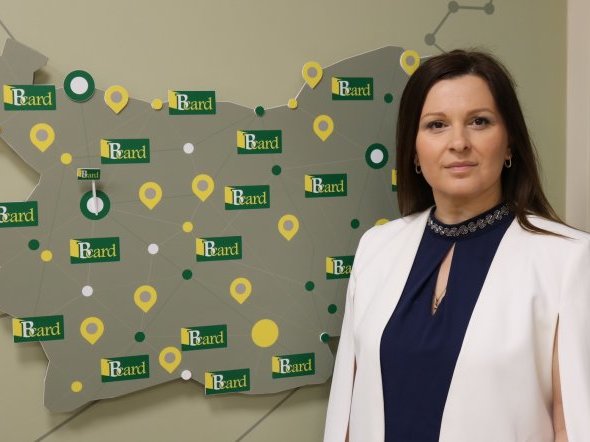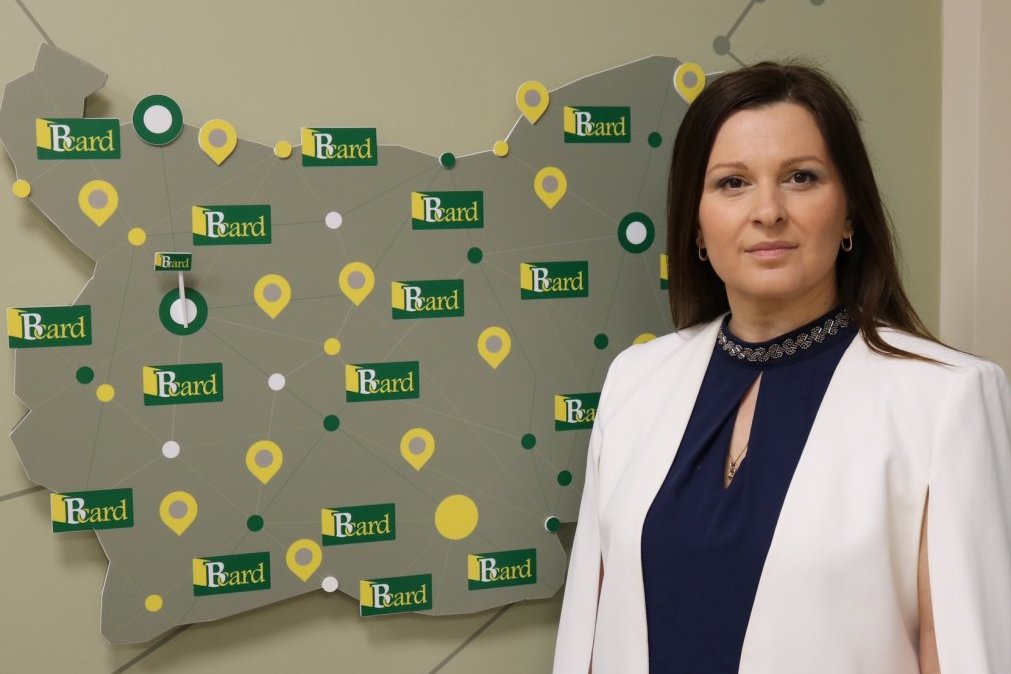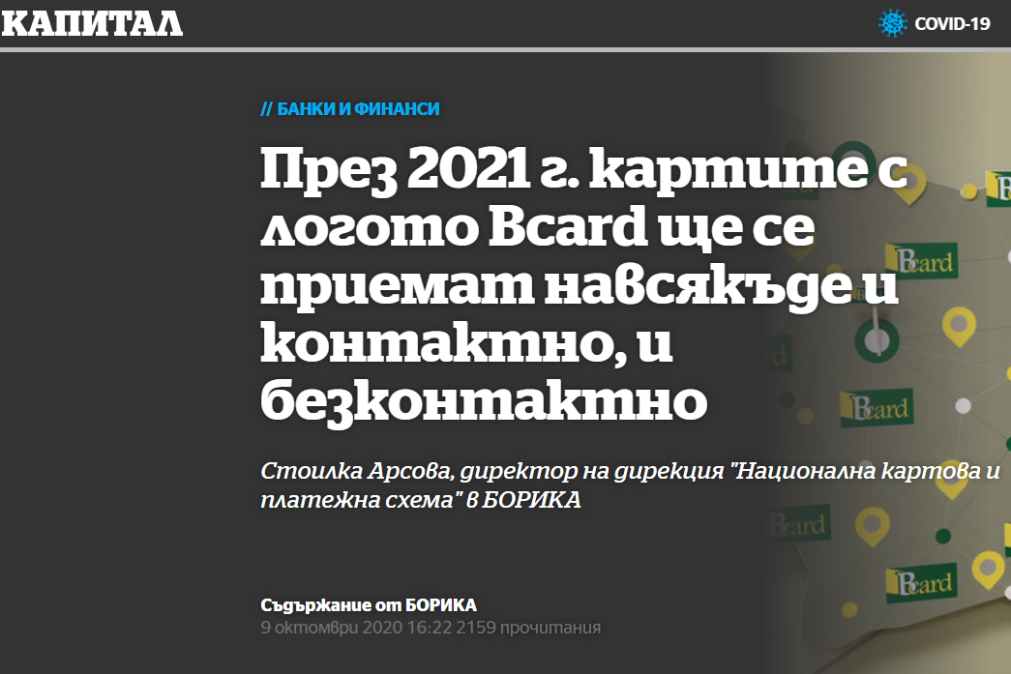Stoilka Arsova for CAPITAL weekly: In 2021 the cards with the Bcard logo will be accepted everywhere, both in a contact and contactless mode

- Mrs Arsova, what is the current state of play in the positioning of the National Card and Payment Scheme (NCPS) and the development of BORICA’s Blink instant payments project?
The National Card and Payment Scheme (NCPS) is a non-profit initiative including long-term development projects. BORICA obtained an operational permit to proceed with the work on the Scheme in mid-2016. Before that, we were in the preparatory phase, during which we conducted a survey among market participants as to the need of such a scheme. We all united around the expectations that such a project will be a driver for the development of the whole sector. In mid-2018, we released the first card on the market. Since then, we have never stopped implementing technologies that ensure the brand’s equal footing in its acceptance as a payment method compared to other card brands in the market. The Scheme successfully ensured contact acceptance of the Bcard brand everywhere in the country, at all ATMs and in the commercial network. Presently, the implementation of the contactless functionality is underway, and as of September 2020 it is operational on around 30% of the POS terminals. This percentage is expected to reach 60-70% of all terminals by the end of the year. Full implementation, which was delayed by the Covid-19 crisis by nearly three months, is expected to happen in the first semester of 2021. This means in the coming year our cards will be accepted everywhere in both contact and contactless mode. The next step in the Scheme’s development will be the implementation of mobile instant payments under the Blink brand. Early this year, by a decision of the Board of Directors of BORICA, the Scheme was renamed to National Card and Payment Scheme (NCPS), with an expanded scope to cover account-to-account instant payments, in addition to card ones.This means in the future NCPS will continue to provide card products and services under the Bcard brand, while instant payments (transfers) in BGN will be identified under the Blink brand. We have a long-term development plan for Blink, which includes all payment service providers in the market and migration to ISO 20022 for electronic data interchange. The Scheme will start the implementation in the terminal network of new technologies allowing for payments via a mobile phone. Thus, customers will be able to pay instantly from their account to a merchant’s account just using a mobile device. Users will identify instant payments by the new logo Blink, which is scheduled to spread across the terminal network in the country from 2022 onwards. In this our main task is to support the functionality from any type of smartphone, regardless of manufacturer and operating system.
- How will mobile instant payments be effected across the market via the Scheme? When is this expected to take place? What are the main challenges in this relation?
The project started this year as part of BORICA’s program for development of a new national payment infrastructure for instant payments. In the first stage of the project, that is to continue until the end of the next year, all market participants are expected to get technologically ready for accepting instant payments within their systems, as well as to have such institutions certified, so that they are able to order instant payments. Our role as a scheme is to standardize this type of payments for all participants, and it is not simply a matter of the payment itself as a type of transaction, but rather of the financial exchange of fees among participants, rules of appeal, fraud management, money laundering prevention policies and measures to combat terrorist financing, customer identification methods, payment authentification, as well as the basic rights and obligations of end customers and merchants. That is, we have to regulate a standard governing the operation of instant payments in Bulgaria. This standard will be compatible with the SEPA Instant Credit Transfer standard.
- What is the outspread of domestic card schemes in Europe? Why would an issuer choose the products of the National Card and Payment Scheme? What are the key advantages?
At present, there are card schemes like ours in Europe, the French Carte Bancaire being a good example. It has fully spread its products and services across all domestic sectors.
It is the same in Germany, Belgium,Spain, Portugal, Denmark, Norway, etc. Similarly to these schemes, in Bulgaria we develop domestically oriented products and services, aiming to cover the sectors of the economy not sufficiently digitalized. According to data of the European Central Bank, there were approximately 7.4 million bank cards in the Bulgarian market as of 2019. This means, every second Bulgarian has two cards on the average. Nevertheless, we are still ranking last with 29 POS terminal payment transactions per capita, compared to an average of 168 transactions for Europe (according to ECB data for 2019). There are many sectors still operating with cash and paper-based payments. Quite significant still is the share of cash-on delivery payments in the country. Around 500,000 bearers of food vouchers effect paper-based payments, which burdens merchants accepting them with further costs. There is cash turnover on the premises of large employers. Significant cash turnover goes daily through vending machines. Sectors such as healthcare, education, transport, etc. are still underdigitalized. On the other hand, merchants having POS terminals installed have increased slightly by 5 - 6 % compared to 2018, that is in the first semester of 2020 (according to NCPS data) there were about 44,000 merchants accepting payments at POS terminals, representing around 10% of the total number of nonfinancial corporations in Bulgaria. We would like to address exactly these niches with products and services of the Scheme, by offering a cheap payment instrument, in addition to the instant payments in BGN, also through the Bcard in a Limited Network brand, targeted at new issuers in the market - employers, schools, universities, large chain stores, courier services and many others. The product is regulated by the Scheme for adoption by sectors of the existing POS infrastructure and can be combined with an access control functionality, as well as with a standard payment application, bearer identification instruments, etc. All participating acquiring institutions, on their part, have agreed to rent out their terminal infrastructure for these transactions, as merchants pay no commission to the bank or payment institution owner of the POS terminal, and settle their financial relations based on a contract concluded between them and the Issuer. The commission for use of a POS terminal is paid by the issuer, and its amount is regulated by the Scheme.
Last but not least, our payment product with the Bcard brand, issued by payment system providers, is a very good solution for over one million pensioners, who according to unofficial data still receive their pensions at cash desks. We also have an Issuer that has recently started issuing Bcards with no fees for customers, which is a good solution for this segment. The phased-in introduction of instant payments in BGN under the Blink brand, from 2021 onwards, will also gradually cover the share of low-cost transfers and payments, such as the phone-to-phone transfer by a synchronized link between phones of small amounts between colleagues, friends, parents and children, etc. Businesses, on their part, will have precedence in receiving funds immediately into their accounts around the clock, regardless if it is a business day or not. The Nordic countries have recently implemented even a type of transaction of instant receipt of cash at a merchant, which is another method of digitalization where the installation of an ATM is not expedient.
- You mentioned that BORICA’s products are entirely on national level. What are the plans for development of NCPS access within Europe or internationally?
We have a vision, similar to those of comparable card schemes in Europe, of ensuring interoperability between our products. In this context, for several years we have been working on European access jointly with other local schemes. Our aim is for Bcard to be used on equal footing on the terminal infrastructure in Europe, and we will soon announce such a partnership in a new company incorporated in Brussels jointly with schemes from Germany, France, Spain, Belgium and Portugal, with whom we invest in and develop an European technology for contactless card payments using a chip named CPACE, which has already been registered with EMVCo. We also monitor European initiatives towards initiation of an European instant payment scheme.
As regards international access, we believe the market in such products is sufficiently saturated. As already mentioned, our policy is aimed at covering niches of low level of electronization in the domestic economy, where the international product is not so suitable due to its higher cost and global rules. Nevertheless, upon a request by our participants we work for providing a possibility for international access. Last year we entered into a contract with the US scheme Discover Financial Services, with whom we will jointly create the product Bcard Discover. Each of our issuers will have the opportunity to add international access to its national card. What is important, is to protect our interests, hence in Bulgaria the product will operate according to the rules and pricing policy of Bcard, and outside the country - according to the rules of the partnering scheme. We are now starting the technological development of the link between the operator BORICA and Discover, and next year we plan to release the first Bcard certified product with international access.
- How is the first national petrol card faring? What are its advantages?
The national petrol card was made possible by the new rules governing products of the Bcard in a Limited Network" brand, I have already mentioned. The first national petrol card with the logo benzin.bg is issued by Motobul EAD. The petrol card is already operating very successfully at several petrol station chains in this country, serviced by four acquiring institutions participating in the Scheme. The Issuer has also certified with us other products of great strategic potential for the development of this sector.
- In addition to the National Petrol Card, on what other national products do you work?
Quite recently, we have started a pilot ‘employer’s card’, which we believe will gain significant interest and will be offered to large employers that would fully prohibit cash payments on their premises. This is a card combining access control, employee identification and other functionalities. The employer may set a limit, which employees will reimburse either from their salary at the end of the month via integration into the payroll system, or replenish from another card of the employee via the website of the scheme, which will soon be commissioned into operation publicly. The employer itself can also extend the use of the card with merchants outside its premises by contracting additional benefits for its employees. The second step in the development of this product is to build on it by combining the employer’s card with an employee’s payment debit card, also adding a food voucher, when this is made possible in a regulatory way.
In this relation, we see great potential in the electronization of paper food vouchers. We have presented the product to all voucher operators in Bulgaria and have initiated a proposal for an amendment to the ordinance with the Ministry of Finance, which regulates them by law.
- Currently you are running a campaign ‘Keep the Bulgarian spirit! Pay with Bcard and enjoy the native’. What are the aims and the expectations about it?
The issuers, rather than the end customers, are our direct users. That is, we have first to convince issuers to issue our products, and then they will decide how to present them to their customers.
The campaign itself is part of the strategy aimed at positioning Bcard and the products of the National Card and Payment Scheme on the market. On the one hand, our objective is to help issuers in promoting this product, and on the other – we would like to get customers to know more about our brand, which is already visible in the POS and ATM network and to seek themselves our card from various issuers. What we wish to focus on in our campaigns is the Bulgarian spirit/make-up, which is worth more that everything else to continue to develop.








